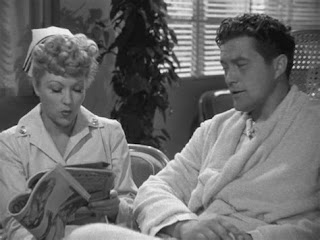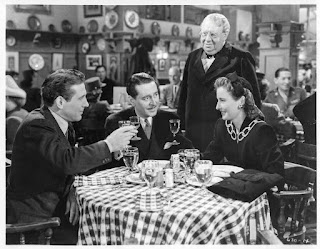But Mary Lee is not convinced he's committed, because he keeps talking about being an artist and footloose and fancy free. She decides the problem is that he's never had experience of real domestic bliss and comes up with a (frankly ludicrous) solution: she will write to the publisher of the magazines she's been reading to Jeffy and get him to get Jeffy to stay with the writer of the articles Elizabeth Lane in the domestic bliss she describes at her farm in Connecticut. Of course Elizabeth Lane is Barbara Stanwyck, and she doesn't really live in a farm in Connecticut, she lives in a New York apartment. However, the publisher Alexander Yardley (Sidney Greenstreet, playing a rare non-evil-schemer part) doesn't know this (and in fact insists that all his publications tell the truth, although one gathers that circulation is his main goal) and is very taken with the idea. He calls Elizabeth's editor, tells him that Elizabeth will be required to host this war hero over Christmas and feed him up with her delicious hand-cooked food and introduce him to her husband and 8-month-old. The editor shows up at Elizabeth's apartment in a tizzy, because he realizes that his job is on the line just as much as hers. Also arriving is John Sloan, a rather pompous architect who is besotted with Elizabeth and keeps asking her to marry him, despite her insistence that she doesn't love him.
Anyway, the editor suggests that Elizabeth tell Yardley that her infant has whooping cough and they can't risk the health of the newly-out-of-hospital war hero. However Yardley is completely unfazed - he has grandchildren and knows that adults can't get whooping cough, and completely talks over Elizabeth at their meeting and even decides that he will show up as well, as his own family is too busy for him. The editor, John Sloan and Elizabeth all gather at Elizabeth's favorite restaurant (run by her older Hungarian friend Felix, who dotes on her (we have already seen him bringing her a mushroom omelet for breakfast in her apartment) whose recipes are the ones she passes off as her own in her column to commiserate.
John Sloan is actually pleased that Elizabeth will lose her job because then she'll be forced to marry him. Then the editor hits on a genius idea: Elizabeth got the idea for "her" farm in Connecticut from the fact that Sloan has one, so if Elizabeth quickly agrees to marry Sloan they can use his farm, and disaster will be averted. Oh, and Felix has to come along and do the cooking because in reality Elizabeth can't cook at all.
So that's the setup. The farm comes with an Irish cook called Norah, played by the annoyingly screechy Una O'Connor (thankfully dialing it down a little in this film) with whom Felix butts heads,
and the time at the farm is a series of farcical events. As a stand-in for the non-existent baby is first a brunette female baby and then a blond male one (who talks, while the other doesn't - something that baffles and perplexes Yardley) belonging to local women who are working in a factory for the war effort and have been leaving them with Norah. Elizabeth is useless at baby care as well, but thankfully Jeffy is an enthusiastic baby bather and diaper-er, thanks to being a loving uncle, so Elizabeth takes advantage of his offers of help.
And, of course, falls hopelessly in love with him (and he with her). There's some slightly scandalous banter when Elizabeth flirts shamelessly with him ("have you ever kissed someone married before") and meanwhile Sloan keeps trying to set up the marriage with the local judge, while Felix, who regards Sloan as far beneath Elizabeth (whom he calls "Lishka" - inspiring Jeffy to do the same) keeps sabotaging these attempts. It all comes to a head when a local group invite the war hero and the publisher to a village dance to sell war bonds and Jeffy and Lishka dance out of the hall and into somebody else's horse-drawn sleigh, while the suspicious Yardley stalks them, and then, having lost them, he returns to spot a strange woman running off with the baby (who is, of course, her own) and calls in the police (who are currently arresting Jeffy and Lishka for theft of the sleigh).
And then Mary Lee shows up! What a shenanigans. Apparently it is both criticized by conservatives for portraying lying as something that leads to happiness, and excoriated by progressives for its portrayal of domestic service as the ideal post-war role for women. Both seem to miss the point, it seems to me, especially as Elizabeth not only keeps her job, she gets a big fat raise, and also she can't cook whereas a man (Felix) can, and happiness is only truly achieved when all the truth comes out. If anything, there are a couple of scenes that are pleasantly progressive - while there are only two black people in the movie (neither in rural Connecticut, perhaps forgivably) they are both rather modern: a female package deliverer,
and a cook in Felix's restaurant to whom he turns for the definition of "catastrophe" and gets a very learned etymology. So I dub it harmless fun. I definitely LOLed a couple of times. A very satisfying Xmas film.









No comments:
Post a Comment